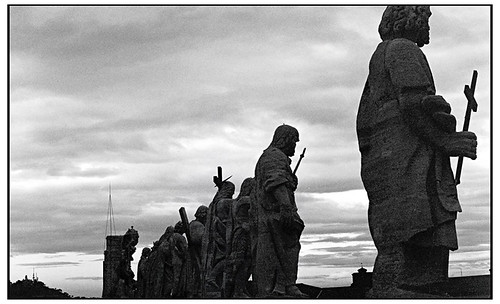By now you’ve probably heard that police served a warrant on Jason Chen, the editor of the technology blog Gizmodo, which is owned by Gawker Media, and seized several computers and storage devices looking for evidence about a blog post discussing the forthcoming iPhone 4g. I’ve been too busy to obsessively read all the news coverage, but what I have read has been interesting.

Such as:
However…
The search warrant is ambiguous about the specific reason the police gave for the search and seizure. Specifically, it’s possible—likely, even—that the police believe Gawker Media committed the felony by acquiring the iPhone (“buying stolen property”).
If that’s the “probable cause” the police used to obtain the warrant, the journalist shield law may not apply.
The police got the warrant by arguing their belief that property at Jason Chen’s house met the following criteria :
* It was used as the means of committing a felony
* It tends to show that a felony has been committed or that a particular person committed a felony
So now the question is… Was the suspected “felony” the THEFT of the iPhone (in which case police want to find out the identity of the thief)? Or was it BUYING STOLEN PROPERTY (in which case Gawker Media and/or Jason Chen may soon be accused of felonies?)
[Click to continue reading GIZMODO SEARCH WARRANT AMBIGUOUS: Police May Allege That GIZMODO Committed The Felony]
Or the NYT
In contrast to Mr. Zimmerman’s views, David Sugden, a California lawyer who specializes in intellectual property litigation, said the state shield law might not apply, if stolen property were involved.
“They could be in a tough spot,” said Mr. Sugden, referring to Gizmodo. “They are trying to turn this case into an issue of protection for online journalists, whereas the other side is going to make it look like someone committed a crime.”
Mr. Sugden cited an example with celebrity images that are often bought by gossip sites like TMZ.com or Us Weekly. He said, “When TMZ takes photos of a celebrity, it’s in plain view, which is legal,” but cautioned, “TMZ would be in trouble if the reporters were breaking into houses to take those photos of people.”
Mr. Sugden said Gizmodo’s best defense would be to argue that it didn’t know the phone was Apple’s property when it was shown to them. “If someone is accused of buying stolen property, it’s not just an issue of whether the property was stolen, it’s a matter of if they knew it was stolen or not,” he said. “The circumstances of the transaction play a large role.”
[Click to continue reading Can Gizmodo Win the iPhone Legal Battle? – Bits Blog – NYTimes.com]
BoingBoing
Police seized Gizmodo editor Jason Chen’s computers. Understandable, given that Gizmodo bought a prototype cellphone which may have been stolen! The obvious assumption is that they believe Chen may have been party to a crime, but it’s also true that the police’s priorities are not those of Apple. The raid could be aimed mostly at learning the identity of the original thief. Stepping beyond the particulars here, however skeevy they may be, this could spell trouble in blogland: a source can’t know what a journalist might do that authorities could
If you read comments at news sites, so many are laughably erroneous, seizing upon the opportunity to bash Apple for perceived crimes against humanity. Many of these foam-at-the-mouth Apple haters claim that Apple’s jack-booted thugs have something to do with the District Attorney’s office actions. While it is true that a District Attorney will probably take a phone call from the corporate counsel of a prominent business located in the district, especially a corporation that contributes much tax revenue to the county’s budget, there aren’t many DAs who would act unless there was a potential actionable crime to investigate. It isn’t like Steve Jobs can order the San Mateo Country District Attorney to break the door of just any blogger without cause.
Apple spent many thousands of dollars creating a prototype, some estimates on the cost range from $15,000 to $20,000, of course they have a vested interest in retrieving their property. Even ignoring Apple’s normal media frenzy practices, and ignoring intellectual property concerns, that’s significant enough value reported stolen to be of interest of law enforcement. It isn’t the same as you losing your cellphone on the bus, it just isn’t.
Engadget, owned by Time Warner, was advised by its lawyers not to purchase the iPhone 4G, publishing photos of it were sufficient. They are not in the cross-hairs of the DA Office either. Gizmodo and Gawker have been reckless, treating the whole incident as a lark, publishing details about criminal acts they probably wish they hadn’t, and still don’t seem to grasp the seriousness of the matter.
The Apple engineer supposedly left his phone on a bar stool, but the only public statement about the details of how the iPhone ended up in a stranger’s possession was issued by Gawker Media. What if the Apple engineer went to the bathroom and when he came back his phone was gone? The finder launched the phone, launched the Apple engineer’s Facebook app, figured out his name, but couldn’t figure out how to return the phone to the engineer? Once the Apple engineer figured out his phone was really missing, he remotely wiped it, but before that happened, the finder conveniently didn’t bother to contact the owner of the phone, or even leave the phone with the bartender. In other words, the “finder” had no intention of returning the phone without getting paid first.
A red herring often discussed is whether the police did anything wrong seizing the computers of Gizmodo blogger Jason Chen. Thieves are usually not accorded special consideration, even if they are bloggers, or journalists. I can’t see that it matters if bloggers are journalists, or journalists are bloggers, or whatever. Stolen property is not the same as evidence of weapons of mass destruction, for instance. A stolen car is a stolen car even if the thief, or the person that purchases the stolen car, has a blog. From my perspective, the iPhone 4G was stolen goods, and should be treated as such. And from my perfunctory reading of relevant California law, the authorities agree.

Randy B. Singer commented on a Tidbits email list:
California law differs from some other states with regard to finding something and not returning it. In California there is the concept of ‘larceny by conversion.” (Actually it is called that in the common law, not in California’s statutory law. But the concept is the same.) This occurs when you come into possession of something that belongs to another, by non-nefarious means, and then you assert dominion or control over that possession in a manner contrary to the rights of the owner.
Selling something that you find that belongs to another would be one way to commit a “theft” under this law. Another way would be to offer it to someone else to dissect and photograph for the public, especially if it is obvious that it is a device that the owner means to keep secret.
Another point is that reporter shield laws in the U.S. (including California) generally protect reporters from searches for privileged information or from revealing anonymous sources. But they usually don’t apply in criminal cases, and I have never heard of one applying in a case where the reporter is accused of a crime that is the essence of the case
Footnotes:































